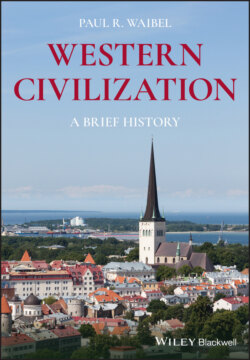Читать книгу Western Civilization - Paul R. Waibel - Страница 36
3 The Roman World Chronology
Оглавление753 BC Traditional Date of Founding of Rome509 BC Rome Becomes a Republic450 BC Law of the Twelve Tables390 BC Gauls Sack Rome264–241 BC First Punic War218–202 BC Second Punic War149–146 BC Third Punic War and Destruction of Carthage134–122 BC Gracchi Brothers' Land Reform60 BC First Triumvirate (J. Caesar, Pompey, Crassus)44 BC Julius Caesar Assassinated43 BC Second Triumvirate (Octavian, Mark Antony, Lepidus)27 BC Roman Empire Begins27 BC–AD 180Pax Romana19 BC Virgil's Aeneidc. 4 BC–c. AD 30/33Jesus of Nazareth AD 235–285“Barracks Emperors” AD 293Diocletian Founded Tetrarchy AD 311Constantine's Edict of Milan AD 381Theodosius I Declares Christianity Only Legal Religion AD 378Battle of Adrianople AD 410Goths Sack Rome AD 426St. Augustine's City of God AD 476End of Roman Empire in the West
According to legend, the city of Rome was founded in 753 BC on a site occupied by an Indo‐European people known as the Latins. At about the same time that Rome was being founded, the prophets Amos and Hosea were warning the Kingdom of Judah of God's impending judgment represented by the threat from the Assyrians; Sparta was coming under the rule of Five Ephors; and in Egypt, Piankhi, an Ethiopian, was founding the 25th Dynasty. Farther afield in India, the Upanishads, the Hindu scriptures, were being written down for the first time, and in China, the original Chou Dynasty was ending, as China slipped into a 500‐year‐long era of warring barons.
Roman history extends chronologically from the middle of the eighth century BC to the fall of the Roman Empire in the West, traditionally dated in AD 476, and beyond, to the fall of Constantinople, the capital of the Eastern Roman (or Byzantine) Empire to the Ottoman Turks in 1453. Roman civilization is the direct ancestor of Western Civilization. It transmitted to Europe Classical humanism and the Judeo‐Christian religious tradition, two primary ingredients of Western Civilization. Its collapse at the end of the fifth century introduced the third major ingredient, the Germanic influence.
Much of what is regarded as typically “Western” originated with or was influenced by the Romans. Many European languages are descended from the Latin spoken by the Romans. Roman law forms the basis of not only the cannon law of the Roman Catholic Church, but of many of the world's legal systems. Roman concepts of government have periodically influenced the development of European governmental institutions. And not least in importance, is the lingering memory of the Pax Romana (Roman Peace), roughly 200 years of peace under a “universal” government.
The essence of Roman civilization is often summed up by the saying that it consisted of an army, an arch, and a law. The Roman army was the best the world had yet seen. With weapons no different than most of their opponents, the Roman legions conquered the Mediterranean world. They were also great builders. From Scotland in the north, to North Africa in the south, and from Spain in the west to Mesopotamia in the east, soldiers and merchants traveled in peace on paved roads from city to city. Mighty stone aqueducts carried water from mountain streams to the cities. Amphitheaters, coliseums, temples, and domed structures built of brick and/or stone shaped the skyline of Roman cities. For centuries following the collapse of the Roman Empire, these great structures served as stone quarries for the conquerors, and still today, the surviving ruins testify to the engineering skills of the Romans and the glory that was Rome.
The Roman discovery of a “common law of nature” enabled them to create a system of laws that was suitable for governing a world empire of diverse cultures. They believed that what is right and what is wrong, what is just and what is unjust, is knowable by reason. Natural law refers to a kind of universal conscience that is shared by all humankind. It provides the basis for law that does not merely reflect the will of the stronger or the whim of the masses. It makes a civilized society possible by giving “both privileges or rights, and responsibilities or duties to the truly wise.” Natural law has profoundly influenced Western legal systems down to the present.1
